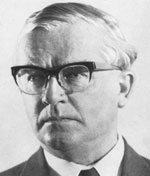This Day in History: March 23, 1966
Additional Date: March 23, 1966
During the 1940s, Bram Fischer served on the Johannesburg District Committee and the Central Committee of the Communist Party of South Africa (later SACP). In 1943, he helped A. B. Xuma revise the African National Congress (ANC) constitution, and was charged with incitement during the mineworkers' strike in 1946. He was also a member of the Congress of Democrats and formed part of the defence team for the leaders of the movement during the Treason Trial of 1956 to 1961. He also defended the accused during the Rivonia Trial in 1964. It was inevitable that his involvement with anti-Apartheid activists and his dedication to the SACP would implicate him in illegal activities. Therefore, in September 1964, Fischer was arrested and charged with being a member of the Communist Party - a banned organisation. He was granted bail, and in January 1965 he went underground. He was only recaptured in November of that year. On 23 March 1966, he was found guilty of violating the Suppression of Communism Act and conspiring to commit sabotage. These convictions lead to a sentence of life imprisonment in Pretoria Central Prison. In 1967, he was awarded the Lenin Peace Prize. During his incarceration, he contracted cancer. A fall induced by the effects of the cancer in September 1974 left Fischer with a fractured neck femur, which left him partially paralysed and unable to talk. It was not until December of that year that the authorities transferred him to a hospital. When news of his illness was publicised, the public lobbied government for his release. Fischer was then placed under house arrest at his brother's home in Bloemfontein in April 1975, and died a few weeks later. The prison had Fischer's ashes returned to them after the funeral, and have therefore never been found.
